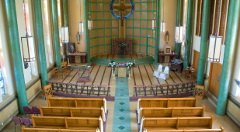 The number of Americans who do not identify with any religion is growing at a rapid pace.
The number of Americans who do not identify with any religion is growing at a rapid pace.
According to a new report from the Pew Research Center’s Forum on Religion & Public Life, about one-fifth of the U.S. public--and a third of adults under age 30--are religiously unaffiliated today. Those are the highest percentages ever in Pew Research Center polling.
In the last five years alone, the unaffiliated have increased from just over 15 percent to just under 20 percent of all U.S. adults. Their ranks now include more than 13 million self-described atheists and agnostics (nearly 6 percent of the U.S. public), as well as nearly 33 million people who say they have no particular religious affiliation (14 percent).
This large and growing group of Americans is less religious than the public at large on many conventional measures, including frequency of attendance at religious services and the degree of importance they attach to religion in their lives. However, many of the country’s 46 million unaffiliated adults are religious or spiritual in some way. Two-thirds of them say they believe in God. More than half say they often feel a deep connection with nature and the earth, more than a third classify themselves as “spiritual” but not “religious,” and one-in-five say they pray every day.
The growth in the number of religiously unaffiliated Americans--sometimes called the rise of the “nones”--is largely driven by generational replacement, the gradual supplanting of older generations by newer ones. A third of adults under 30 have no religious affiliation, compared with just one-in-1- among those who are 65 and older. And young adults today are much more likely to be unaffiliated than previous generations were at a similar stage in their lives.
While the ranks of the unaffiliated have grown significantly over the past five years, the Protestant share of the population has shrunk. In 2007, 53 percent of adults in Pew Research Center surveys described themselves as Protestant. In multiple surveys conducted in the first half of 2012, fewer than half of American adults say they are Protestant (48 percent). This marks the first time in Pew Research Center surveys that the Protestant share of the population has dipped significantly below 50 percent. The decline is concentrated among white Protestants, including those who consider themselves born-again or evangelical Protestants as well as those who do not.
Get Spirit-filled content delivered right to your inbox! Click here to subscribe to our newsletter.
Dr. Mark Rutland's
National Institute of Christian Leadership (NICL)
The NICL is one of the top leadership training programs in the U.S. taught by Dr. Mark Rutland. If you're the type of leader that likes to have total control over every aspect of your ministry and your future success, the NICL is right for you!
FREE NICL MINI-COURSE - Enroll for 3-hours of training from Dr. Rutland's full leadership course. Experience the NICL and decide if this training is right for you and your team.
Do you feel stuck? Do you feel like you’re not growing? Do you need help from an expert in leadership? There is no other leadership training like the NICL. Gain the leadership skills and confidence you need to lead your church, business or ministry. Get ready to accomplish all of your God-given dreams. CLICK HERE for NICL training dates and details.The NICL Online is an option for any leader with time or schedule constraints. It's also for leaders who want to expedite their training to receive advanced standing for Master Level credit hours. Work through Dr. Rutland's full training from the comfort of your home or ministry at your pace. Learn more about NICL Online. Learn more about NICL Online.


